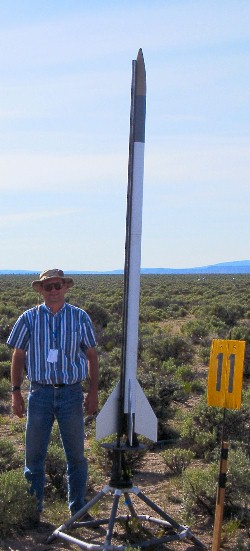
|
| Personal background |
|---|
I am 45 years old, married, a former Marine, and currently employed as an electrical engineer in the semiconductor equipment industry. I live and work in Hillsboro, OR.
My hobbies are amateur radio, high power sport rocketry, computers, and storm chasing, ie., tornados!
SETI@home ties in nicely with my amateur radio and computer hobbies. Ham radio operators use computers in many aspects of their hobby while operating their radios to make contact with other people all over the world.
SETI@home is trying to determine the existence of extraterrestrial life via the reception of artificially produced radio signals from outside our planetary system.
If my computer were to crunch ET's signal it would be like the ultimate ham radio contact. 73, ET! (73 is radio shorthand for 'Best Regards'.)
As far as high power sport rocketry, what other hobby allows someone to be an engineer and have fun like a little kid at the same time?
Tornado chasing gives me the occasional adrenalin fix that we all need now and again. My last chase was in June 1999, where my chase partner and I saw one daytime tornado, and four nighttime tornados on the same night from the same storm system. We got just a little too close to those. |
| Thoughts about SETI and SETI@home |
|---|
Does extraterrestrial life exist? Given the immense number of stars in our galaxy, the millions of planetary systems that must exist, and the near certainty that tens-of-thousands or even hundreds-of-thousands of Earth-like planets must be out there, I’d say the odds are in ET’s favor.
That doesn’t even take into account the possibility of non-carbon based life, or the existence of life in galaxies other than our own.
Current research seems to indicate that life will arise when the proper biological precursors and environmental conditions are available over a long period. I suspect proof of this will be found on Mars in the not too distant future. In my opinion, life has existed there in the past, and might possibly survive in under the Martian surface in small colonies of microbial organisms. (Perhaps we shouldn’t allow the first explorers of Mars to take any Lysol along. )
Whether life can attain an intelligent level elsewhere is another question entirely. It will be settled only when we either detect its presence from Earth or nearby, or after we have managed to visit every likely candidate planet in the galaxy.
Visitation is currently, and may be forever (God, I hope not!), impossible. SETI@home would seem to be the most viable search method at present.
What is best about SETI@home is that it provides a unique opportunity for the average person, wherever they reside on this planet, to participate in serious scientific research. It is entirely possible that a Joe or Jane Sixpack could have a major role in what may eventually be the most momentous scientific and philosophical discovery in the history of mankind.
|
| Your feedback on this profile |
|---|
| Recommend this profile for User of the Day: |
I like this profile |
| Alert administrators to an offensive profile: |
I do not like this profile |
|
| Account data |
View |
| Team |
None |
|

